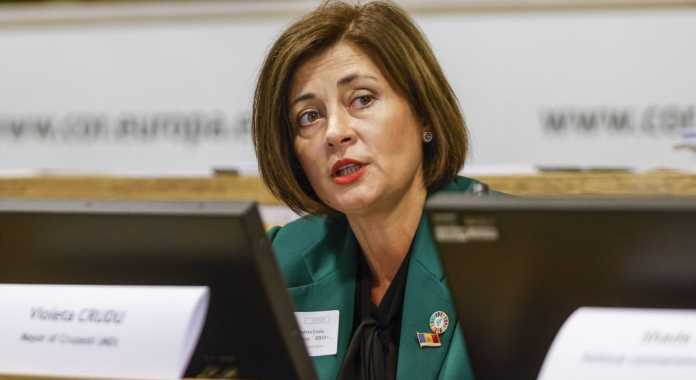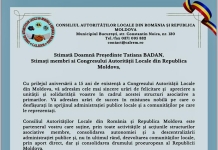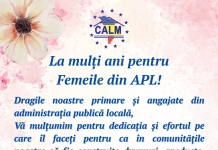Violeta Crudu is the Mayor of Cruzești, a commune of Chișinău municipality, the President of the Network of Women Mayors of the Congress of Local Authorities (CALM) and PLATFORMA spokesperson. In an exclusive interview with CEMR and PLATFORMA, she is reacting to the results of the recent presidential elections and EU referendum.
Question: Given the results of the recent Presidential elections and Referendum on EU integration in Moldova, what specific changes do you anticipate for local authorities, and how could these changes affect local governance and service delivery?
In recent years, we have been focusing on the positive aspects of Moldova’s journey towards joining the European Union (EU). Our pro-European president, Maia Sandu, who has just been re-elected for a second term, is leading this effort. This alignment with the EU gives us hope, and we are excited to share this optimism with our citizens.
As a mayor, I believe that Moldova’s path to the EU will support all levels of governance in our country. However, this process also brings new responsibilities, and local governments in Moldova need better tools and training. We want to help local officials improve their skills, particularly in applying for EU funded projects and developing local initiatives. Additionally, we will enhance our efforts to advocate for local governments and their representative association – the Congress of Local Authorities of Moldova (CALM) – to play a bigger role in shaping important policies and reforms.
With the recent election results and a clear direction towards the EU, we hope to access more funding from the central government. Local governments should have the ability to apply for these fundings fairly, without political interference. We also want to pursue direct funding opportunities, enabling local governments to secure financial support both from within our country and from international sources, such as EU environmental programs. This will help us address local issues more effectively and reduce reliance on traditional government channels.
Moreover, during this second presidential term of President Sandu, we plan to strengthen our communication with the central government, ensuring ongoing discussions that are productive and beneficial. This dialogue will also be important at the EU level, and we will lean on our European networks (the Council of European Municipalities and Regions, and the Committee of the Regions) to assist us.
We also acknowledge the need to enhance the expertise within CALM. The dedicated experts there are working hard to tackle various challenges, and we must continue to support their development to meet the growing demands of local governance.
All these goals reflect our commitment to improving local governance, delivering better services, and ensuring that local authorities can effectively meet the needs of our citizens.
Question: What concrete actions is your municipality taking to support a green transition in line with EU environmental goals, and what challenges do you face in implementing sustainable policies?
To support a green transition aligned with EU environmental goals, the municipality of Cruzești has taken several concrete steps. For instance, afforestation is one of the big challenges we can combat on the municipal level. We are actively expanding tree-planting efforts, focusing on unused and degraded land to restore ecosystems and combat soil erosion. When it comes to energy efficiency, we have implemented policies mandating thermal insulation for homes and public buildings, aiming to reduce energy consumption and improve energy efficiency. Our municipality also offers assistance to companies investing in renewable energy projects, encouraging the shift to cleaner energy sources. And on waste management, we are enhancing waste processing and sorting facilities, updating waste management laws, and conducting public awareness campaigns on climate change.
Despite these efforts, we face significant challenges. Public demand for climate-related services is growing faster than our resources can handle. Government support has not yet scaled to match these needs, which limits our ability to meet citizens’ expectations for comprehensive climate initiatives. While we encourage proactive climate actions from our residents, meeting these demands fully remains challenging.
Question: As Mayor and President of the Women Mayors Network Moldova, what measures have you implemented to promote gender equality, and what progress have you observed so far? What are your observations and experiences in terms of hate speech (cyber and physical) against women politicians in Moldova, including President Maia Sandu? Can you combat the hate speech and if yes, how?
As Mayor and President of the Women Mayors Network in Moldova, I have actively worked to promote gender equality and support women in politics through several key initiatives: for instance, we focus on training women who are interested in real political involvement, providing them with the skills and resources to navigate political life effectively, engage in elections, and face challenges confidently. This support aims to empower women to participate meaningfully in politics, where they often encounter stereotypes and resistance.
We advocate for stronger legal protections for women in public office. While Moldova has made progress with laws to protect women in general, specific protections for women in political roles remain vague and insufficient. There is also a concerning lack of trust in the judicial system to enforce these laws effectively.
On the municipal level, we continue to press for the training of police officers and legal personnel to handle hate speech cases involving women politicians seriously. However, with limited staffing and societal prejudice, enforcement remains weak.
A pervasive view in society is that women entering politics should “accept” hate speech and abuse as part of the role or simply ignore it. This attitude discourages many qualified women from pursuing public office, as they do not feel supported or safe.
Women politicians, including President Maia Sandu, face significant challenges. Online and offline, hate speech and discriminatory remarks are common, and Moldova lacks a clear and concrete system to protect women in public office from such abuse. I raised this issue directly with President Sandu, questioning her perception of her own safety and the adequacy of state protections for women in politics. Unfortunately, I did not receive a definitive answer, highlighting the need for more commitment and action at all levels to combat hate speech effectively and to support women in politics fully.
Therefore, combatting hate speech is challenging but possible. We are working to push for stronger laws and better training for effective law enforcement. Additionally, we encourage public awareness campaigns to change societal perceptions about women in politics and reduce the acceptance of hate speech. However, without more concrete support from state institutions, achieving substantial change will be difficult.
Question: What is your stance on the proposed decentralisation reform and potential reduction in the number of municipalities in Moldova? How do you foresee this influencing local governance, community representation, and resource allocation?
I have several concerns regarding the proposed decentralisation and potential reduction in the number of municipalities. The current push for municipalities to voluntarily merge has been slow and ineffective. Few municipalities have chosen to amalgamate, partly due to insufficient government efforts to promote the reform and communicate its benefits to the public. Without clear information, citizens lack confidence in the reform, and opposition to it remains strong. Furthermore, the financial incentives offered for amalgamation are minimal and lack a strategic foundation. They do not provide enough motivation for municipalities to merge, nor do they assure local leaders that amalgamation will lead to meaningful development or help address major challenges. This has led to the perception that merging smaller, financially struggling areas will simply create a larger struggling entity.
Reducing the number of municipalities could weaken community representation. Local governance works best when it is close to the people it serves; consolidating municipalities may dilute this connection, making it harder to address specific community needs. There is also a risk that amalgamation could lead to an imbalance in resource distribution, potentially leaving some areas with even fewer resources than before. Without a well-thought-out plan to equitably allocate resources, this reform could exacerbate inequalities between regions.
Overall, while decentralisation has potential, this reform requires more careful planning, clearer benefits for communities, and stronger financial incentives. Otherwise, it risks failing to achieve its goals and may negatively impact local governance and representation.
Picture © Elio Germani 2024 for CEMR/PLATFORMA









